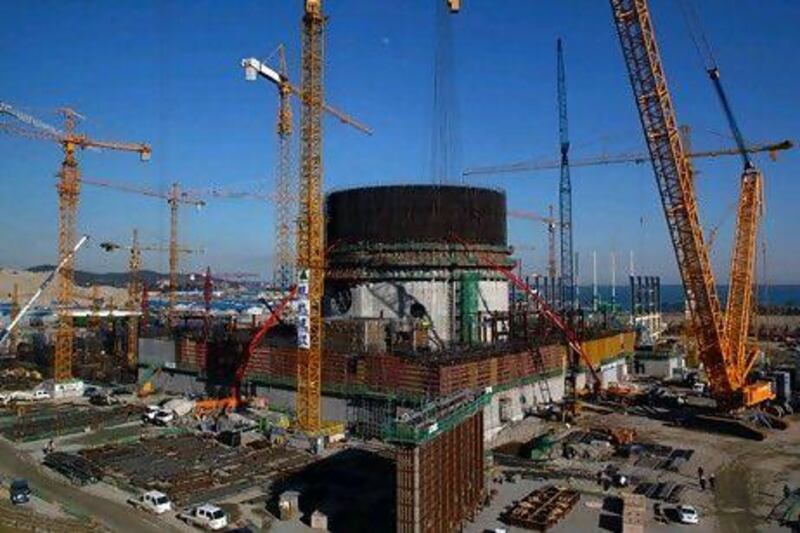SEOUL // The South Korean consortium building Abu Dhabi's nuclear plant has shortened its construction schedule by four months - to January 2017 - and expects to pour the first concrete in July.
Its progress in delivering the Arab world's first reactors is being closely watched as Korea Electric Power Corporation (Kepco), the company leading the US$20.4 billion (Dh74.9bn) contract for the emirate's four reactors, pursues more work in countries including India and Finland.
Efforts to bring equipment and people in ahead of time to Baraka, the preferred reactor site 300km west of the capital, have helped to speed up the construction timetable, said Jun-Yeon Byun, the chief nuclear officer at Kepco.
The timing ultimately hinges on approval from the UAE regulator.
"After we were awarded the UAE project, the presence of Korea as a nuclear powerhouse and Kepco's reputation and brand has gone up significantly," Mr Byun said at Kepco's headquarters in Seoul.
"Before we won the UAE project, I had travelled around to several countries at least 30 times a year. But after the awarding, that's gone down by at least half - because they're visiting us."
Last month the company announced a target to sell two nuclear reactors this year to expand its foreign business "aggressively".
It is in talks with Malaysia, India, Vietnam and South Africa for nuclear plant contracts, and its fortunes have also brightened in Finland and Turkey.
Finland invited Korea Hydro & Nuclear Power, a Kepco subsidiary, in March to bid for its next reactor alongside Areva, GE Hitachi, Mitsubishi and Toshiba.
Kepco also continued discussions with Turkey last month at a nuclear summit in South Korea.
Talks between the two nations for four reactors on the Black Sea broke down in 2010, with Ankara ultimately handing its first contract to Russia.
"With Korea before we couldn't reach an agreement, but we hope we will soon," Taner Yildiz, the Turkish energy minister, said in Seoul last week.
But South Korea, which prides itself on transforming from a nuclear importer to exporter over four decades, must compete with multinational consortiums from countries including the United States and Japan, as well as with the nuclear newcomer China.
Kepco has agreed to hold joint workshops on nuclear cooperation with China Guangdong Nuclear Power Group, one of China's main two nuclear builders, and is seeking other partners.
"At these times it's quite difficult for a single company to enter the nuclear export market alone," said Mr Byun.
"And so we're also seeking to strategically partner our competitors - or collaborators - in the future."
Another challenge Kepco faces is supplying nuclear fuel for its reactors at home and abroad.
South Korea forfeited the right to enrich uranium or reprocess much of its spent fuel in an agreement with the US in 1974, and that puts it at a disadvantage to nuclear vendors from France and Russia. Seoul also says it is at the mercy of the markets should the price of enriched uranium, which it buys from foreign vendors to make into fuel assemblies, suddenly rises.
The US agreement, signed four years before Korea's first reactor came online, expires in 2014.
"At the time Korea had no nuclear power plants, no nuclear technology at all, so it was kind of one-sided," said Mr Byun.
"But now the tables have turned."
Kepco operates more than 20 reactors, has an additional seven under construction and has become a nuclear exporter.
"As a democratic country that has been peacefully using nuclear energy and trying to contribute to the commercial usage of nuclear power in the world, enrichment and reprocessing are some technologies that we absolutely need to further make a contribution to the world," Mr Byun said.
"There are some obstacles in terms of international dynamics, but I believe that this will be well resolved."





